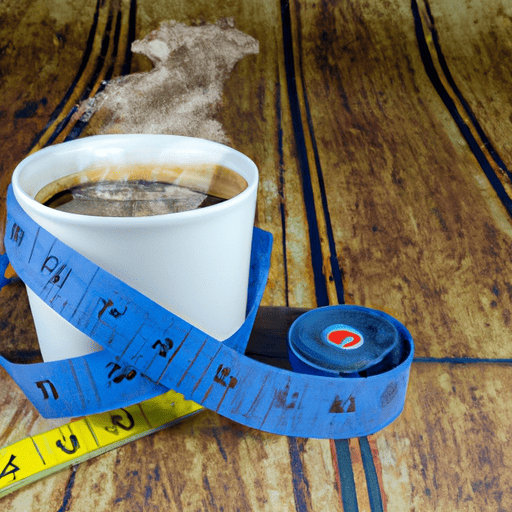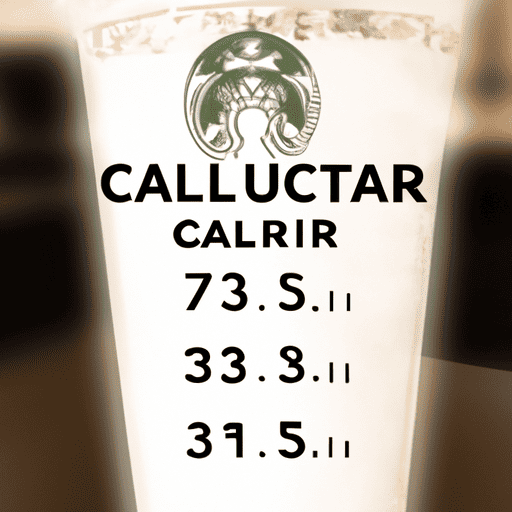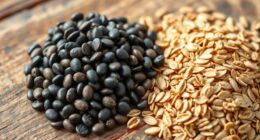Have you ever wondered if there is a simple way to improve our digestive health?
Well, we’ve got some great news for you! Tiny superseeds might just be the answer you’ve been looking for.
Chia seeds, in particular, have been found to offer numerous benefits for digestion and gut health. From providing natural remedies for constipation to enhancing digestive enzymes, incorporating chia seeds into your diet can be a practical and effective way to support your digestive system.
So, let’s dive into the wonderful world of chia seeds and discover how they can aid in digestive wellness.

Key Takeaways
- Chia seeds are high in fiber, omega-3 fatty acids, antioxidants, protein, and essential vitamins and minerals, making them beneficial for digestive wellness.
- Chia seeds promote regular bowel movements and prevent constipation due to their soluble fiber content.
- Chia seeds can help regulate blood sugar levels and reduce the risk of diabetes.
- Chia seeds have anti-inflammatory properties and may benefit conditions such as inflammatory bowel diseases.
Benefits of Chia Seeds for Digestion
Chia seeds have been found to improve digestion. These tiny superseeds are packed with fiber, which is essential for maintaining a healthy digestive system. Fiber adds bulk to the stool, making it easier to pass through the intestines and preventing constipation. Additionally, chia seeds absorb liquid and form a gel-like substance in the digestive tract, which aids in the smooth movement of food through the system.
Not only do chia seeds promote digestion, but they also have other health benefits. They’re known to aid in weight loss by promoting a feeling of fullness and reducing appetite. The high fiber content in chia seeds slows down the digestion of carbohydrates, preventing sudden spikes in blood sugar levels. This makes them beneficial for blood sugar control, especially for individuals with diabetes.
Incorporating chia seeds into your diet is a simple and practical way to improve digestion and promote overall wellness.
How Chia Seeds Support Gut Health
To further understand the benefits of incorporating chia seeds into our diet, let’s explore how these tiny superseeds support gut health.

Chia seeds are rich in fiber, which is essential for a healthy digestive system. The soluble fiber in chia seeds acts as a prebiotic, providing nourishment for the beneficial gut bacteria. This helps to maintain a healthy balance of gut flora and promotes optimal digestion.
Additionally, chia seeds have anti-inflammatory properties. Inflammation in the gut can lead to digestive issues such as bloating, gas, and discomfort. The omega-3 fatty acids found in chia seeds help to reduce inflammation in the gut, supporting overall gut health.
By incorporating chia seeds into our diet, we can support the growth of beneficial gut bacteria and reduce inflammation in the gut. This can contribute to improved digestion and overall gut health.
Now, let’s explore how chia seeds can serve as a natural remedy for constipation.

Chia Seeds: A Natural Remedy for Constipation
A high-fiber diet can help alleviate constipation, and chia seeds can be an effective natural remedy.
Chia seeds are a great addition to your diet if you’re looking for a gentle and natural way to relieve constipation. These tiny seeds are packed with fiber, which adds bulk to your stool and helps promote regular bowel movements. Just one ounce of chia seeds contains a whopping 10 grams of fiber!
When consumed, chia seeds absorb water and form a gel-like substance in the digestive system, which helps soften the stool and make it easier to pass.
Incorporating chia seeds into your daily routine is simple. You can sprinkle them on your oatmeal, blend them into smoothies, or even use them as an egg substitute in baking.

Remember to drink plenty of water when consuming fiber-rich foods like chia seeds to ensure optimal digestion.
Enhancing Digestive Enzymes With Chia Seeds
One way to enhance our digestive enzymes is by incorporating chia seeds into our diet. Chia seeds are tiny superseeds that offer a multitude of health benefits, including aiding in digestion. These seeds contain a high amount of fiber, which helps to regulate bowel movements and prevent constipation.
Additionally, chia seeds can promote weight loss by increasing feelings of fullness and reducing calorie intake. They’re also beneficial for cardiovascular health due to their omega-3 fatty acid content, which can help lower cholesterol levels and reduce the risk of heart disease.
Adding chia seeds to our meals or snacks is a simple and effective way to support our digestive system and overall wellness.
Incorporating Chia Seeds Into a Digestive Wellness Diet
Our digestive wellness diet includes incorporating chia seeds into our meals and snacks to maximize their benefits. Chia seeds are a versatile ingredient that can be easily incorporated into many recipes. They’re a great source of fiber, which helps promote healthy digestion and prevent constipation. Chia seeds also contain omega-3 fatty acids, which have been shown to reduce inflammation in the gut and improve overall digestive health. Additionally, chia seeds can aid in weight loss by promoting feelings of fullness and reducing appetite.
Here are a few simple chia seed recipes to try:
- Chia Seed Pudding: Mix chia seeds with your choice of milk, sweetener, and flavorings like vanilla or cocoa powder. Let it sit overnight and enjoy a creamy pudding-like texture in the morning.
- Chia Seed Smoothie: Add a tablespoon of chia seeds to your favorite smoothie recipe for an extra boost of fiber and omega-3s.
- Chia Seed Energy Balls: Combine chia seeds with nut butter, honey, and oats. Roll into bite-sized balls for a nutritious and energizing snack.
Frequently Asked Questions
How Many Chia Seeds Should I Consume Daily for Optimal Digestive Wellness?
For optimal digestive wellness, we recommend incorporating chia seeds into your daily diet. Chia seeds have been shown to support gut health, and a serving of 1-2 tablespoons is a good starting point.
Can Chia Seeds Help Reduce Symptoms of Acid Reflux or Heartburn?
Yes, chia seeds can be a natural remedy for acid reflux or heartburn. They improve digestion and reduce bloating. Incorporating chia seeds into our diet may help alleviate these symptoms and promote overall digestive wellness.

Are Chia Seeds Safe to Consume for Individuals With Digestive Disorders Such as Irritable Bowel Syndrome (Ibs) or Crohn’s Disease?
Chia seeds can be safe for individuals with digestive disorders like IBS or Crohn’s disease. However, it’s important to be aware of any potential safety concerns and consult with a healthcare professional. Chia seeds have numerous benefits for digestive wellness.
Can Chia Seeds Help Alleviate Symptoms of Bloating and Gas?
Chia seeds can potentially help alleviate symptoms of bloating and gas. They are known for their high fiber content, which can promote regular bowel movements and aid in digestion.
Are There Any Potential Side Effects or Precautions to Consider When Incorporating Chia Seeds Into a Digestive Wellness Diet?
When incorporating chia seeds into a digestive wellness diet, it is important to consider potential side effects and take precautions. It is recommended to start with small amounts and increase gradually to avoid digestive discomfort.
Conclusion
Incorporating chia seeds into our diet can be a small but mighty step towards improving digestive wellness. These tiny superseeds are packed with fiber, omega-3 fatty acids, and antioxidants that support gut health and aid in digestion.

Like a gentle broom for our intestines, chia seeds can help relieve constipation and promote regularity. By enhancing digestive enzymes, they ensure that our bodies efficiently break down and absorb nutrients.
So, let’s sprinkle some chia seeds into our meals and nourish our digestive system like a well-tended garden.
















